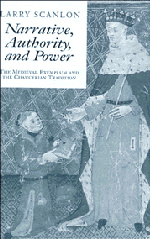5 - The public exemplum
Published online by Cambridge University Press: 16 September 2009
Summary
The public exemplum played a crucial role in the Chaucerian adaptation of the form, one that has been largely neglected. Three central characteristics of the public exemplum distinguish it from the sermon exemplum, and the Chaucerian exemplum will draw on all three. First, the public exemplum addresses issues of lay authority. It is classicizing and political where the sermon is hagiographical and ecclesiological. For this reason the public exemplum is usually described as the classical exemplum. I have adopted the term public because not all of these exempla came from classical sources, including many of the most influential, such as the Donation of Constantine. Moreover, these exempla did not simply reiterate the classical, even when they did draw on classical tradition. Like its classical antecedent, the medieval public exemplum was concerned with rei publicae, public matters, but these were its own, contemporary public matters, not the civic virtues of some timeless humanitas.
Second, the public exemplum had a propensity toward the evil example, toward narratives which demonstrate the efficacy of their sententiae by enacting violations of them. The sermon exemplum, with its continual recourse to the miraculous tends in the other direction, toward the benevolent example, the narrative which fulfills its sententia, revealing it as narrative result. This rhetorical propensity of the public exemplum is simultaneously thematic, an insistence on the inherent disorder of the historical world it addresses.
- Type
- Chapter
- Information
- Narrative, Authority and PowerThe Medieval Exemplum and the Chaucerian Tradition, pp. 81 - 134Publisher: Cambridge University PressPrint publication year: 1994



